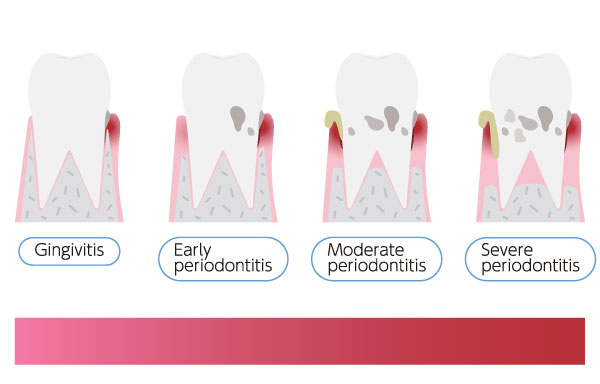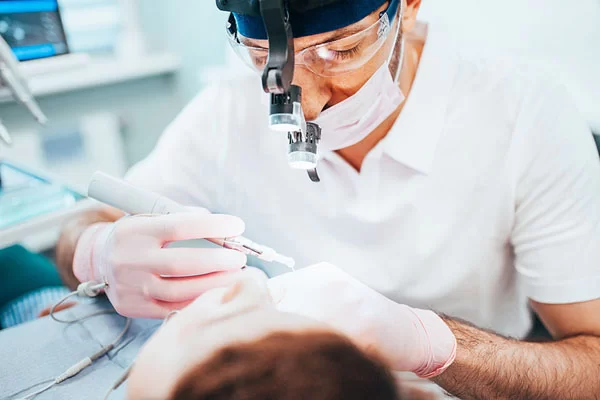Early Detection Saves Your Smile from Gum Disease Near You
Gum disease, medically known as periodontal disease, affects millions of Americans and remains one of the leading causes of tooth loss in adults. If you’re experiencing bleeding gums, bad breath, or swollen gums, you’re not alone – and more importantly, you’re not without hope. Our experienced dentist in Holyoke, MA, is here to help you understand the stages of gum diseaseand provide the early treatment you need to protect your oral health.
Understanding how gum disease progresses through its distinct stages empowers you to recognize early signs and seek timely intervention. From the initial inflammation of gingivitis to the advanced bone loss of severe periodontitis, each stage presents unique challenges and treatment opportunities.
Ready to protect your smile? Contact our Holyoke dental officetoday at(413) 538-7400 to schedule your comprehensive dental exam. We proudly serve patients in Holyoke, Westfield, Southampton, South Hadley, and throughout Greater Springfield.
The 4 Stages of Gum Disease
Stage 1: Gingivitis – The Reversible First Stage
Gingivitisrepresents the earliest stage of periodontal disease and the only stage that can be completely reversed with proper treatment. This mild inflammation of the gum tissues occurs when plaque and tartar buildup along the gum line triggers your body’s immune response.
Common symptoms of gingivitis include:
- Bleeding gums during brushing or flossing
- Swollen or tender gums
- Persistent bad breath (halitosis)
- Gum sensitivity when eating or drinking
- Slight gum recession
- Changes in gum color from pink to reddish
The good news? Gingivitis responds exceptionally well to improved oral hygiene practices. With consistent brushing twice daily, daily flossing, and regular dental cleanings, many patients see significant improvement within weeks. Our dental team in Holyoke provides personalized oral hygiene instruction to help you maintain healthy gums at home.
Stage 2: Early Periodontitis – When Infection Progresses
If gingivitis is left untreated, bacterial toxins begin penetrating deeper into the gum tissues, marking the transition to early periodontitis. At this stage, the infection starts affecting the supporting structures of your teeth, including the periodontal ligament and alveolar bone.
Early periodontitis symptoms include:
- Persistent bleeding during routine oral care
- Formation of periodontal pockets (spaces between teeth and gums)
- Increased tooth sensitivity
- Noticeable gum recession
- Mild tooth mobility
- Chronic bad breath that doesn’t improve with brushing
Treatment for early periodontitis typically involves scaling and root planing, a deep cleaning procedure that removes plaque and tartar from beneath the gum line. This non-surgical treatment helps eliminate bacterial infection and promotes healing of the affected soft tissue.
Stage 3: Moderate Periodontitis – Significant Tissue Damage
Moderate periodontitisrepresents a critical turning point where substantial bone loss and gum recession become apparent. The infection has now compromised the tooth structure’s supporting foundation, leading to more severe symptoms and complex treatment requirements.
Moderate periodontitis warning signs:
- Deep periodontal pockets (5-7mm)
- Significant gum recession exposing tooth roots
- Tooth migration or shifting positions
- Painful gum abscesses
- Changes in your bite alignment
- Discomfort while chewing
- Pronounced tooth sensitivity
Treatment at this stage often requires a combination of scaling and root planing, antibiotic therapy, and potentially surgical intervention. Our experienced dentists may recommend guided tissue regeneration or bone grafting procedures to help restore lost bone and soft tissue support.
Stage 4: Advanced Periodontitis – Severe Bone Loss and Tooth Loss
Advanced periodontitisrepresents the most severe stage of gum disease, characterized by extensive bone loss, severe gum recession, and significant tooth mobility. Without immediate professional intervention, affected teeth may require extraction.
Advanced periodontitis symptoms:
- Severe, persistent pain
- Loose or shifting teeth
- Tooth loss
- Pus discharge from gums
- Painful abscesses
- Severe gum inflammation and bleeding
- Significant changes in facial structure
Treatment for advanced periodontitis may involve periodontal surgery, tooth extraction, and comprehensive reconstructive procedures. While this stage represents serious oral health challenges, our dental team works closely with patients to develop personalized treatment plans that restore function and aesthetics.
Modern Gum Disease Treatment Options in Holyoke
Non-Surgical Treatments
- Scaling and Root Planing: This deep cleaning procedure removes plaque and tartar buildup from tooth surfaces and root areas below the gum line. The process involves smoothing rough root surfaces to help prevent future bacterial accumulation.
- Antibiotic Therapy: Targeted antibiotics help eliminate bacterial infections and reduce inflammation. These may be prescribed as oral medications or applied directly to affected areas.
- Laser Therapy: Lasers can precisely remove diseased tissue and bacteria while promoting healing, offering a minimally invasive alternative to traditional surgical procedures.
Surgical Treatments
- Pocket Reduction Surgery: This procedure reduces the depth of periodontal pockets, making it easier to maintain proper oral hygiene and prevent future infection.
- Bone Grafting: When significant bone loss has occurred, bone grafting procedures help regenerate lost bone tissue and provide better support for teeth.
- Soft Tissue Grafts: These procedures address gum recession by transplanting healthy tissue to cover exposed tooth roots.
Prevention: Your Best Defense Against Gum Disease
Essential Daily Oral Hygiene
- Proper Brushing Technique: Brush your teeth twice daily using fluoride toothpaste and a soft-bristled toothbrush. Focus on the gum line where plaque tends to accumulate.
- Daily Flossing: Flossing removes plaque and food particles from between teeth and along the gum line – areas your toothbrush can’t reach effectively.
- Antimicrobial Mouthwash: Using an antimicrobial mouthwash helps reduce bacteria levels in your mouth and provides additional protection against gum disease.
Regular Dental Visits
Professional dental cleanings every six monthshelp remove plaque and tartar buildup that regular brushing and flossing can’t eliminate. During these visits, our dental team can identify early signs of gum disease and provide timely intervention.
Risk Factors to Address
- Smoking and tobacco use
- Diabetes
- Stress
- Poor nutrition
- Certain medications
- Genetics
- Hormonal changes
The Connection Between Gum Disease and Overall Health
Research continues to reveal important connections between periodontal disease and systemic health conditions. The bacteria responsible for gum disease can enter the bloodstream and potentially contribute to:
- Cardiovascular disease
- Stroke
- Diabetes complications
- Respiratory problems
- Pregnancy complications
Managing your gum health isn’t just about preserving your smile – it’s an investment in your overall well-being.
Frequently Asked Questions
Your comprehensive dental exam will include a thorough evaluation of your gum health, measurement of periodontal pockets, assessment of tooth mobility, and digital X-rays to evaluate bone levels. We’ll discuss your symptoms, medical history, and develop a personalized treatment plan.
While genetics plays a role in gum disease susceptibility, proper oral hygiene and regular dental care can significantly reduce your risk. Many patients with a family history of gum disease maintain excellent oral health through consistent preventive care.
Early signs include bleeding gums when brushing or flossing, persistent bad breath, gum sensitivity, and slight gum recession. If you notice any of these symptoms, schedule an appointment with our Holyoke dental team promptly.
Patients with gum disease typically require more frequent dental visits – often every three to four monthsinstead of the standard six-month schedule. Our team will recommend an appropriate maintenance schedule based on your individual needs.
Take Action Today: Schedule Your Gum Disease Evaluation
Don’t let gum disease progress to more serious stages. Early detection and treatment can save your teeth and protect your overall health. Our skilled dental team in Holyoke combines advanced treatment techniques with compassionate care to help you achieve optimal oral health.
Contact our Holyoke dental officetoday at(413) 538-7400to schedule your dental appointment. Our dental practice proudly serves patients in Holyoke, Westfield, Southampton, South Hadley, and Greater Springfield.


